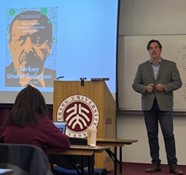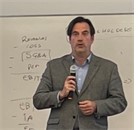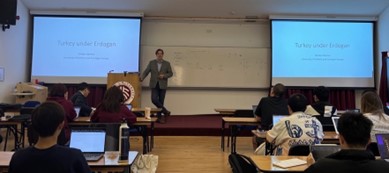On Wednesday, 7 June 2023, PHBS-UK had the pleasure of having Dr Dimitar Bechev from the University of Oxford and Carnegie Europe to give our students a talk on the topic of “Turkey under Erdogan”. As 2023 marks the centennial of the founding of the Turkish Republic and the dissolution of the Ottoman Empire, Dr Bechev’s seminar wanted to highlight how, in just 20 years, one party led from its inception by one leader (excluding the period between August 2014 and May 2017), the Justice and Development Party (AKP) under Recep Tayyip Erdoğan, has made Turkey reverse course from the eight-decade order sustained by secular Kemalists who founded Turkey.

Dr Dimitar Bechev is a Lecturer at the Oxford School of Global and Area Studies (OSGA), University of Oxford. He is the author of the books Turkey under Erdoğan, the seminar topic and Rival Power: Russia in Southeast Europe, which explores Russia’s role in Southeast Europe (Balkans, Greece, Cyprus, and Turkey). He is also the co-editor of Russia Rising: Putin’s Foreign Policy in the Middle East and North Africa. Dr Bechev has published extensively, in both academic and policy format, on EU foreign relations, the politics of Turkey and the Balkans, Russian foreign policy, and energy security. He has held research and teaching positions at Oxford and Hitotsubashi University in Tokyo as well as visiting fellowships at Harvard and the London School of Economics. From 2010 to 2014, he was the head of the European Council on Foreign Relations (ECFR) office in Sofia. Dr Bechev is a frequent contributor to Foreign Policy, Al Jazeera Online, Oxford Analytica, POLITICO, and EUObserver. His quotes have appeared in leading newspapers such as the Financial Times, the Economist, the Wall Street Journal, and the New York Times. He holds a DPhil in international relations from the University of Oxford. It is truly our pleasure to have Dr Bechev give a seminar to our students.

In the first half of his seminar, Dr Bechev gave the students a brief historical account of Turkey’s political trajectory - from the era of reform and prosperity in the 2000s, to the effects of the war in neighboring Syria, and to the genesis of the populist-nationalist regime led by an all-powerful president. Dr Bechev continued to give the students an incisive account of Erdoğan’s Turkey – showing how its troubling transformation may be short-lived. Turkey was once a pillar of the Western alliance, but after coming to power in 2002, as explained by Dr Bechev, Recep Tayyip Erdoğan has overseen a radical transformation of Turkey. The country has since then embarked on a militaristic foreign policy, intervening in regional flashpoints from Nagorno-Karabakh to Libya. As a result, according to Dr Bechev, Turkey’s democracy once sustained by the aspiration to join the European Union, has now given way to a one-man rule.

In the second half of the seminar, Dr Bechev traced the political trajectory of Erdoğan’s populist regime, from the era of reform and prosperity in the 2000s to the effects of the war in neighboring Syria. Through an intriguing tale of missed opportunities, Dr Bechev took our students on an exploratory journey on how Turkey parted ways with the United States and Europe, and in doing so, embraced Putin’s Russia and other revisionist powers. Turkey now, as Dr Bechev pointed out, sees itself as a self-standing power poised between Russia, on the one hand, and Europe and the US, on the other. Dr Bechev also explained how Erdoğan replaced a frail democratic regime with an authoritarian one.
Despite this, Dr Bechev argued that Turkey’s democratic instincts are resilient, its economic ties to Europe are as strong as ever, and Erdoğan will fail to achieve a fully autocratic regime.
It was an intriguing and thought-provoking seminar with numerous questions from our students. Many questions revolved around the political and economic challenges Turkey faces ahead after the elections in 2023. We thank Dr Bechev for sharing his research and experience with our students and we hope to be able to have more opportunities to learn from him in the future.


